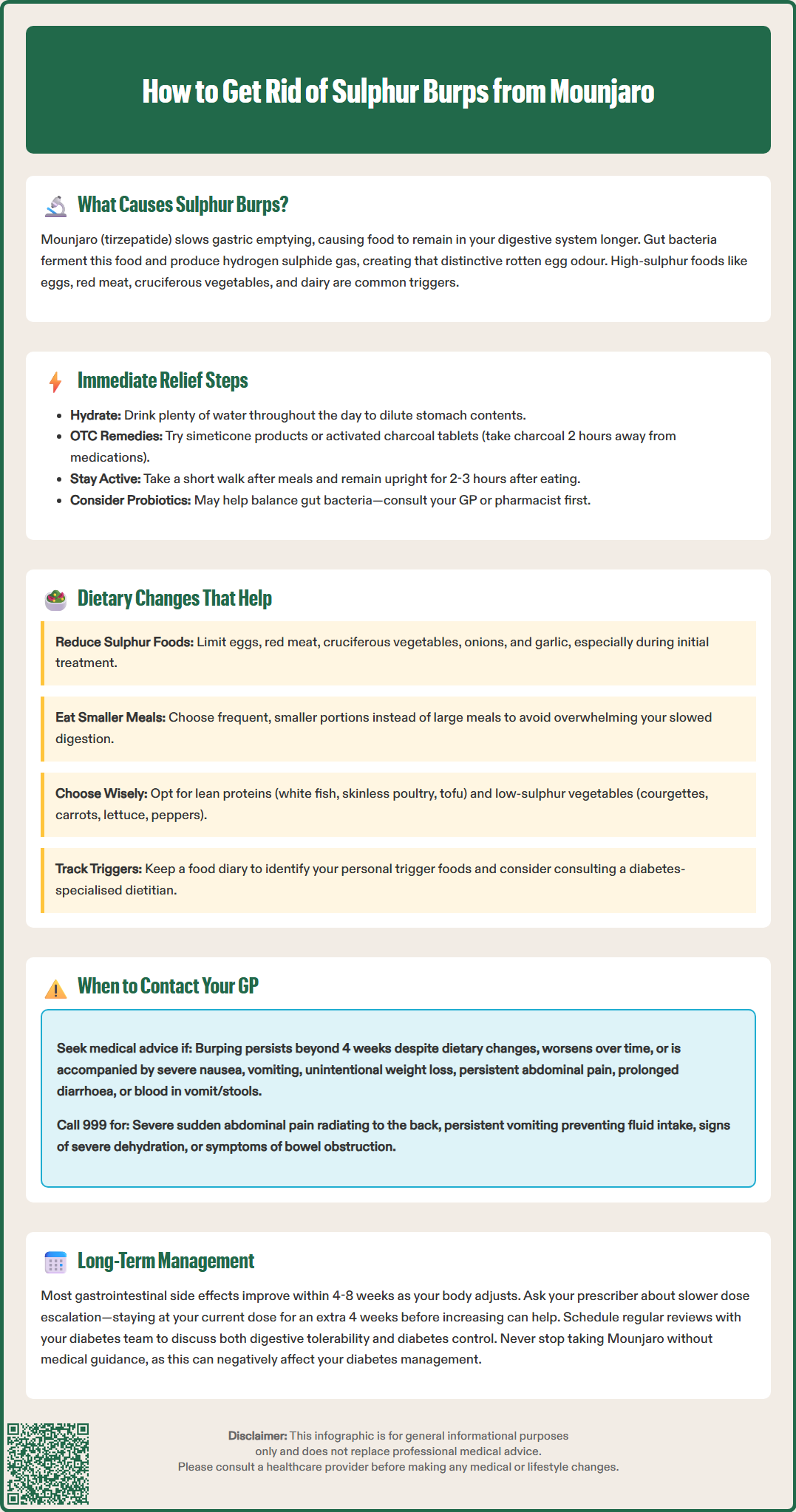
Sulphur burps—characterised by a distinctive rotten egg odour—are an unpleasant digestive symptom some patients experience whilst taking Mounjaro (tirzepatide) for type 2 diabetes. These burps typically result from delayed gastric emptying, a known effect of this GLP-1 and GIP receptor agonist, which allows sulphur-rich foods to undergo bacterial fermentation in the gut, producing hydrogen sulphide gas. Whilst generally benign, these symptoms can affect quality of life and treatment adherence. This article explores practical strategies to manage and prevent sulphur burps on Mounjaro, including dietary modifications, immediate relief measures, and guidance on when to seek medical review for persistent or concerning symptoms.
Quick Answer: Sulphur burps from Mounjaro can be managed through dietary modifications (reducing high-sulphur foods like eggs and red meat), staying well-hydrated, eating smaller frequent meals, and using over-the-counter remedies such as peppermint tea or simeticone.

Mounjaro® is the most innovative GLP-1 medication proven to dramatically curb appetite, hunger, and cravings to help professional men achieve substantial weight loss.
Start Here
Wegovy® is a weekly injectable GLP-1 medication with proven effectiveness in reducing appetite, hunger, and cravings to help busy professionals lose significant weight.
Start HereMounjaro (tirzepatide) is a glucagon-like peptide-1 (GLP-1) and glucose-dependent insulinotropic polypeptide (GIP) receptor agonist licensed in the UK for type 2 diabetes management. Some patients report experiencing foul-smelling burps with a distinctive rotten egg odour (sometimes called 'sulphur burps') during treatment, although this specific symptom is not listed in the official Summary of Product Characteristics (SmPC).
The potential mechanism behind these unpleasant burps likely relates to tirzepatide's effect on gastric emptying. As stated in the SmPC, Mounjaro slows the rate at which food moves from the stomach into the small intestine, which is part of how it helps regulate blood glucose and promotes satiety. This delayed gastric emptying can lead to food remaining in the digestive system for extended periods, particularly foods high in sulphur-containing compounds such as proteins. When these foods undergo bacterial fermentation in the gastrointestinal tract (primarily in the small intestine and colon), hydrogen sulphide gas may be produced—the source of the characteristic sulphurous smell.
Certain dietary proteins (eggs, red meat, cruciferous vegetables, dairy products) are particularly rich in sulphur-containing amino acids like methionine and cysteine. When digestion is slowed, these compounds may have more opportunity to be broken down by gut bacteria, potentially releasing hydrogen sulphide.
It is important to note that whilst these burps can be unpleasant, they are usually benign. However, if accompanied by severe abdominal pain, persistent vomiting, or signs of pancreatitis, immediate medical attention is required. Many patients find that digestive symptoms diminish as their body adjusts to the medication, typically within the first few weeks of treatment or following dose escalation.

When experiencing unpleasant burps whilst taking Mounjaro, several immediate interventions may provide symptomatic relief.
Hydration and digestive aids form the first line of home management. Drinking plenty of water throughout the day helps dilute stomach contents and may ease digestive discomfort. Peppermint tea has traditionally been used to soothe digestive symptoms, though people with gastro-oesophageal reflux disease (GORD) should be cautious as peppermint can worsen reflux by relaxing the lower oesophageal sphincter. Some patients find that over-the-counter remedies containing simeticone (an anti-foaming agent) can help disperse gas bubbles in the digestive tract, though these address symptoms rather than the underlying cause.
Activated charcoal tablets, available from pharmacies, may help absorb excess gas in the digestive system. However, it is crucial to take these at least two hours away from any oral medications, as charcoal can interfere with drug absorption. This separation is not necessary for Mounjaro itself as it is administered by subcutaneous injection, but remains important for any oral medicines you take. Always consult your pharmacist before using activated charcoal, as it may cause constipation in some people.
Gentle physical activity such as a short walk after meals can stimulate digestive motility and help move food through the gastrointestinal tract more efficiently. Avoid lying down immediately after eating, as this can exacerbate delayed gastric emptying. Instead, remain upright for at least two to three hours post-meal.
Probiotics might help some individuals by supporting gut bacteria balance, though evidence specifically for sulphur burps is limited. If considering probiotics, discuss with your GP or pharmacist, particularly if you have diabetes-related complications or are immunocompromised.
If symptoms are severe or persistent despite these measures, do not simply discontinue Mounjaro without medical guidance—contact your prescribing clinician to discuss symptom management strategies or potential dose adjustment. You can also report suspected side effects via the MHRA Yellow Card Scheme (yellowcard.mhra.gov.uk).
Dietary modifications may help reduce unpleasant burps whilst taking Mounjaro. The key principle is to reduce intake of high-sulphur foods and gas-forming foods whilst maintaining adequate nutrition for diabetes management.
Foods that may contribute to symptoms include:
Eggs (particularly egg yolks, which are rich in sulphur-containing amino acids)
Red meat and processed meats (beef, pork, lamb, bacon, sausages)
Cruciferous vegetables (broccoli, cauliflower, Brussels sprouts, cabbage)
Allium vegetables (onions, garlic, leeks)
Some dairy products (milk, cheese, particularly aged varieties)
Certain legumes (chickpeas, lentils in large quantities)
Protein supplements (whey protein powders)
This does not mean eliminating these foods entirely, but rather moderating portions and frequency, particularly during the initial weeks of Mounjaro treatment or following dose increases. Individual triggers vary considerably.
Recommended dietary approaches include:
Smaller, more frequent meals rather than large portions, which can overwhelm the already-slowed digestive system
Lean proteins such as white fish, skinless poultry, and plant-based options like tofu
Low-sulphur vegetables including courgettes, carrots, lettuce, cucumbers, and peppers
Whole grains in moderate amounts (brown rice, oats, quinoa)
Adequate fibre intake to support regular bowel movements, but introduced gradually to avoid additional bloating
Eating habits are equally important. Chew food thoroughly to aid digestion, eat slowly to reduce air swallowing (which can contribute to burping), and avoid carbonated beverages, which introduce additional gas into the digestive system. Keep a food diary to identify specific triggers.
Consult a registered dietitian with diabetes expertise if you need support balancing these dietary changes with glycaemic control and nutritional adequacy. The British Dietetic Association offers resources on managing digestive symptoms while maintaining a balanced diet.
Whilst unpleasant burps are generally a benign side effect, certain circumstances warrant prompt medical review to exclude more serious gastrointestinal complications.
Contact your GP or diabetes specialist nurse if:
Symptoms persist beyond four weeks despite dietary modifications
Symptoms worsen rather than improve over time
You experience severe or persistent nausea and vomiting, which may indicate severe delayed gastric emptying
There is unintentional weight loss beyond expected therapeutic effects
You develop persistent abdominal pain, particularly in the upper abdomen
Burps are accompanied by diarrhoea lasting more than 48 hours or signs of dehydration
You notice blood in vomit or stools, or black, tarry stools (seek urgent medical attention)
You develop right upper abdominal pain with or without fever/jaundice, which could indicate gallbladder problems
If you cannot contact your GP and need urgent advice, call NHS 111.
Seek immediate medical attention (call 999 or attend A&E) if you experience:
Severe, sudden abdominal pain radiating to the back, which may indicate pancreatitis—a rare but serious side effect of GLP-1 receptor agonists
Persistent vomiting preventing fluid intake
Signs of severe dehydration (dizziness, reduced urination, confusion)
Symptoms of bowel obstruction (severe bloating, inability to pass wind or stools, vomiting)
Your GP may wish to review your Mounjaro dose, as dose reduction or temporary treatment interruption can sometimes resolve gastrointestinal side effects whilst maintaining glycaemic benefits. In some cases, investigation may be warranted to exclude other causes of digestive symptoms, such as Helicobacter pylori infection, small intestinal bacterial overgrowth (SIBO), or other gastrointestinal conditions.
Never discontinue Mounjaro abruptly without medical guidance, as this may affect your diabetes control. Your healthcare team can work with you to find the optimal balance between therapeutic benefit and tolerability.
For patients continuing Mounjaro therapy, establishing sustainable strategies to manage digestive side effects is essential for treatment adherence and quality of life.
Dose titration and tolerance: According to the Mounjaro SmPC, tirzepatide is typically initiated at 2.5 mg once weekly, with increases every four weeks as tolerated. If unpleasant burps or other digestive symptoms emerge during dose escalation, discuss with your prescriber whether maintaining your current dose for an additional four weeks might allow your body more time to adapt before further increases. Some patients find their optimal therapeutic dose is lower than the maximum licensed dose, and this is clinically acceptable if glycaemic targets are achieved.
Ongoing dietary vigilance remains important. As your body adjusts to Mounjaro, you may find you can gradually reintroduce some previously problematic foods in small amounts without triggering symptoms. Continue monitoring your individual tolerance and maintain a balanced diet that supports both diabetes management and digestive comfort.
Medication timing considerations: Taking Mounjaro at a consistent time each week helps establish routine. The SmPC does not specify a particular time of day for administration, so choose a regular day and time that works with your schedule.
Regular review with your diabetes team is essential. Your appointments should include discussion of gastrointestinal tolerability alongside glycaemic control (HbA1c), weight changes, and cardiovascular risk factors. If digestive side effects significantly impair quality of life despite management strategies, alternative diabetes medications may be considered.
Special considerations: If you require any procedures involving anaesthesia or sedation, inform your healthcare team that you are taking Mounjaro, as delayed gastric emptying may affect procedural planning.
Patient support and realistic expectations: Understanding that gastrointestinal side effects typically improve within 4–8 weeks for most patients can help maintain treatment adherence during the adjustment period. Connect with diabetes support groups where others share experiences, though always verify medical advice with qualified healthcare professionals rather than relying solely on anecdotal information.
Mounjaro slows gastric emptying, causing food (particularly sulphur-rich proteins) to remain in the digestive system longer, where bacterial fermentation produces hydrogen sulphide gas responsible for the rotten egg smell.
Reduce intake of high-sulphur foods including eggs, red meat, cruciferous vegetables (broccoli, cauliflower), onions, garlic, aged cheese, and protein supplements, particularly during initial treatment or dose increases.
Contact your GP if symptoms persist beyond four weeks despite dietary changes, worsen over time, or are accompanied by severe abdominal pain, persistent vomiting, blood in stools, or signs of dehydration. Seek immediate medical attention for severe sudden abdominal pain radiating to the back, which may indicate pancreatitis.
All medical content on this blog is created based on reputable, evidence-based sources and reviewed regularly for accuracy and relevance. While we strive to keep content up to date with the latest research and clinical guidelines, it is intended for general informational purposes only.
DisclaimerThis content is not a substitute for professional medical advice, diagnosis, or treatment. Always consult a qualified healthcare professional with any medical questions or concerns. Use of the information is at your own risk, and we are not responsible for any consequences resulting from its use.